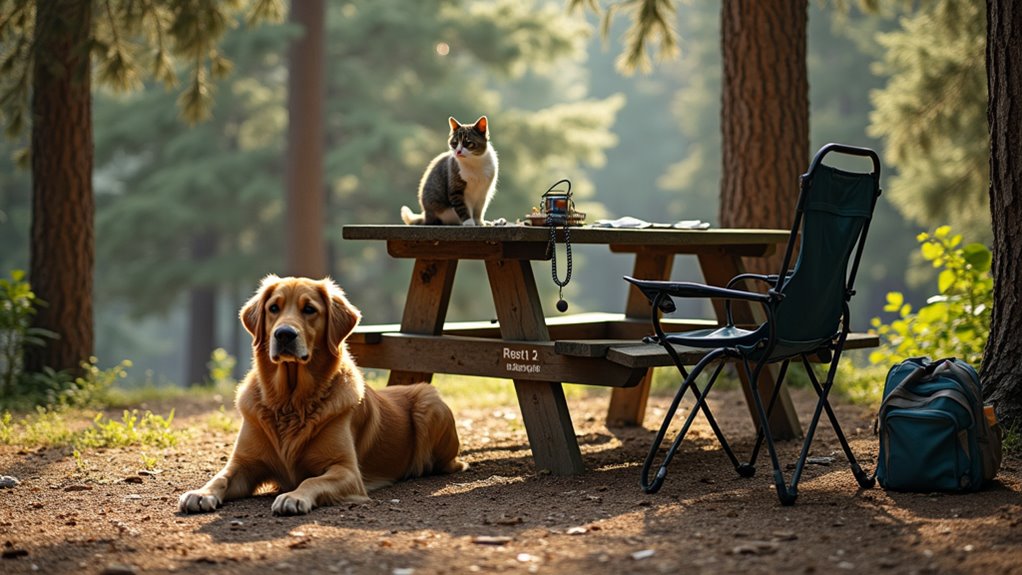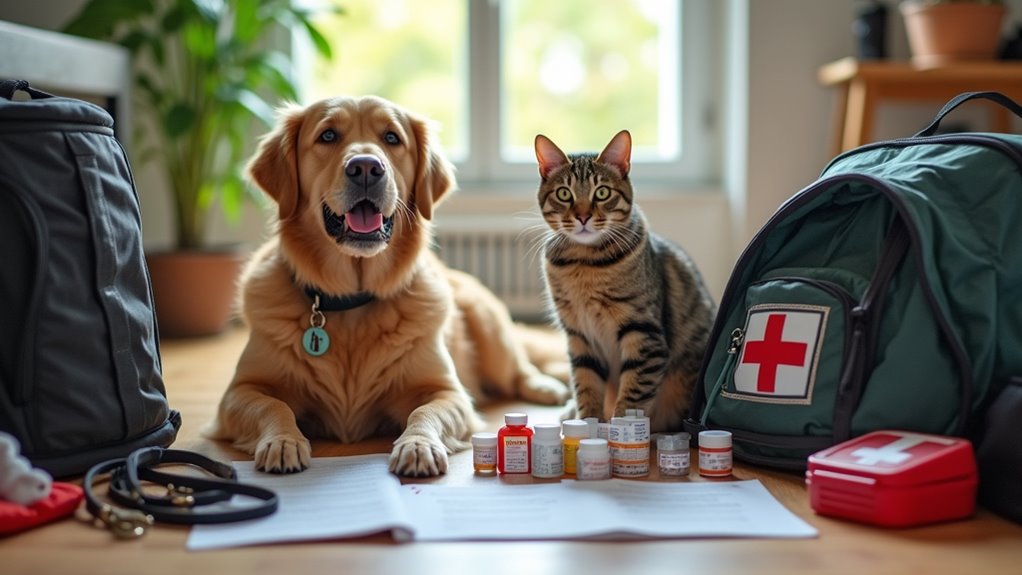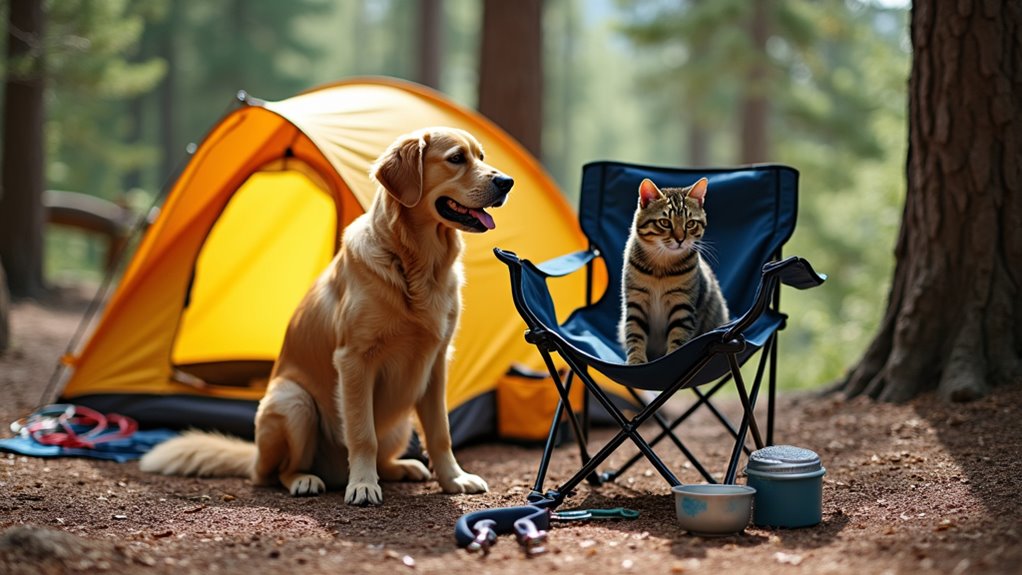Physical Address
304 North Cardinal St.
Dorchester Center, MA 02124
Physical Address
304 North Cardinal St.
Dorchester Center, MA 02124

Just imagine your pet's reaction to their first wilderness adventure—but are you prepared for what could go wrong?
You’ve probably wondered if your dog would love sleeping under the stars as much as you do, or whether your cat could handle a weekend away from home. Camping with pets isn’t just about packing an extra leash and hoping for the best—it requires strategic planning, from selecting the right campsite to managing unexpected wildlife encounters. The difference between a magical outdoor adventure and a stressful disaster often comes down to preparation you haven’t considered yet.

Where can you take your four-legged companion for an unforgettable outdoor adventure? Start by researching pet-friendly campgrounds that explicitly welcome animals.
National parks often restrict pets to developed areas and require leashes, while state parks typically offer more flexibility. Private campgrounds frequently provide dog runs and pet amenities.
State parks generally allow more pet freedom than national parks, while private campgrounds often feature dedicated dog areas and specialized amenities.
Check specific regulations before booking. Most sites require current vaccination records, leash requirements, and quiet hours compliance.
Some charge pet fees ranging from $5-25 per night. You’ll need to clean up after your pet and prevent excessive barking.
Review campsite layouts carefully. Look for sites with adequate space for your dog to move around comfortably.
Avoid sites near busy roads or water hazards. Reserve early, as pet-friendly spots fill quickly during peak seasons.
Always bring proper camping gear specifically designed for your pets to ensure their comfort and safety throughout your outdoor adventure.
Once you’ve secured the perfect pet-friendly campsite, you’ll need to pack the right gear to keep your furry friend safe, comfortable, and happy throughout your outdoor adventure. Start with a sturdy leash, collar with ID tags, and a comfortable harness.
Pack a portable water bowl, enough food for the entire trip, and familiar treats. Don’t forget waste bags for cleanup and a first-aid kit with pet-specific supplies like bandages and antiseptic.
A weather-appropriate sleeping pad or blanket will help your pet rest comfortably. Consider bringing a portable fence or tie-out cable for secure containment.
Pack any necessary medications, grooming supplies, and a favorite toy to reduce anxiety in the new environment. Just as Bolivia showcases natural wonders that exceed expectations, your camping adventure with pets can reveal the extraordinary beauty of sharing outdoor experiences with your beloved companions.

Before packing your gear, schedule a pre-trip veterinary checkup to verify your dog’s vaccinations are current and they’re healthy enough for outdoor activities. Make certain rabies, distemper, and Lyme disease vaccinations are up-to-date, especially if you’re heading to tick-prone areas.
Schedule a pre-trip vet checkup to ensure your dog’s vaccinations are current and they’re healthy for outdoor adventures.
Pack a thorough first-aid kit containing bandages, antiseptic wipes, tweezers for tick removal, and any prescribed medications.
Research local wildlife threats like snakes, bears, or poisonous plants in your destination area. Download offline maps showing nearest emergency veterinary clinics.
Update your dog’s ID tags with current contact information and consider GPS tracking collars for remote locations. Microchip verification ensures your pet’s identification remains accessible if tags are lost.
Discuss preventive treatments for fleas, ticks, and heartworm with your veterinarian based on your specific camping region’s parasite risks.
Just as climbers benefit from following injury prevention tips to stay safe during outdoor adventures, pet owners should implement safety measures to protect their furry companions during camping trips.
While your dog’s natural curiosity makes every camping trip an adventure, it can also lead them straight into dangerous situations with wildlife and environmental hazards. Keep your dog leashed at all times, especially during dawn and dusk when wildlife is most active.
Store food in bear-proof containers and never let your dog eat animal droppings or drink from stagnant water sources.
Watch for signs of snakes, including rustling sounds and unusual scents that make your dog alert. If you encounter large wildlife like bears or coyotes, keep your dog close and back away slowly without running.
Check your dog’s paws regularly for cuts, thorns, or hot surfaces. Pack extra water since dehydration happens quickly outdoors, and recognize signs of overheating like excessive panting.
In mountainous regions, be especially cautious around glacier climbing areas where icy conditions and unstable terrain can pose serious risks to both you and your pet.

After you’ve assessed the campsite for potential dangers, your next priority becomes creating a comfortable and secure base camp that works for both you and your furry companion. Smart setup prevents problems and establishes clear boundaries that’ll keep everyone relaxed.
Follow this systematic approach:
If you’re camping near water and enjoy fishing, consider whether renting or buying a boat makes more sense for pet-friendly trips where your four-legged friend can join you on the water.
Consistency from day one helps your pet adapt quickly to the outdoor environment.
How do you keep your pet engaged and happy during those long camping hours between meals and sleep? Dogs thrive on hiking trails, playing fetch with tennis balls, and swimming in safe water sources. Pack a frisbee or rope toy for active play sessions.
Cats prefer familiar toys like feather wands and catnip mice – set up a secure screened area where they can safely observe wildlife.
Small pets like rabbits need supervised ground time in portable exercise pens, while birds enjoy perching outside their travel cages under shade.
Create scavenger hunts by hiding treats around your campsite perimeter. Remember to match activities to your pet’s energy level and the day’s temperature.
Always supervise outdoor playtime to prevent encounters with wildlife. Despite your best planning, knowing how to handle camping mishaps will help you respond quickly if your pet gets into an unexpected situation during outdoor activities.
Think of camping with your pets as orchestrating a symphony—every element must harmonize for the perfect outdoor experience. You’ve got the knowledge to choose the right campsite, pack essential gear, and handle whatever nature throws your way. Your furry companions are counting on your preparation and leadership. Don’t let planning overwhelm you; start small with weekend trips to build confidence. With proper preparation, you’ll create unforgettable memories that’ll strengthen your bond forever.